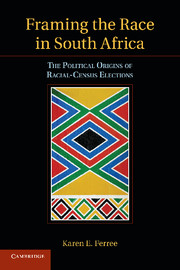Book contents
- Frontmatter
- Contents
- List of Tables
- Acknowledgments
- 1 Introduction
- 2 Voters
- 3 The 1994 Campaigns
- 4 The 1999 Campaigns
- 5 The 2004 Campaigns
- 6 Can a Leopard Change Its Spots? Candidate Demographics and Party Label Change
- 7 Why So Slow? The Political Challenges of Candidate Transformation for Opposition Parties
- 8 Negative Framing Strategies and African Opposition Parties
- 9 Conclusion: South Africa in Comparative Perspective
- References
- Index
- Titles in the series
7 - Why So Slow? The Political Challenges of Candidate Transformation for Opposition Parties
Published online by Cambridge University Press: 06 December 2010
- Frontmatter
- Contents
- List of Tables
- Acknowledgments
- 1 Introduction
- 2 Voters
- 3 The 1994 Campaigns
- 4 The 1999 Campaigns
- 5 The 2004 Campaigns
- 6 Can a Leopard Change Its Spots? Candidate Demographics and Party Label Change
- 7 Why So Slow? The Political Challenges of Candidate Transformation for Opposition Parties
- 8 Negative Framing Strategies and African Opposition Parties
- 9 Conclusion: South Africa in Comparative Perspective
- References
- Index
- Titles in the series
Summary
Given the importance of the transformation of candidate characteristics to party label change, why have South Africa's opposition parties not moved faster in transforming their lists and why, in particular, have they resisted changing the very top positions? In this chapter, I explore how party size affects the ability of parties to transform their candidate demographics, paying particular attention to the role that candidate quality plays in this process. I argue that small parties are especially sensitive to the quality of incoming candidates. Because they control only a small number of seats, any seats they take from existing members for new recruits are necessarily top-level seats, most likely filled with high-quality party leaders. To maintain overall candidate quality, small parties must therefore recruit only high-quality new candidates. At the same time, small parties face significant disadvantages in obtaining these candidates because they are neither able to grow their own nor poach them from other parties. As a result, the challenges of elite incorporation are more difficult for small parties. I argue that these intuitions hold regardless of the internal organization of the party and explain why the pace of candidate change has been slow for South Africa's opposition parties. I then evaluate several observable implications of this argument using the data on candidate career paths introduced in the previous chapter. I also explore the collapse of the New National Party shortly after the 2004 election and the role candidate transformation played in it.
- Type
- Chapter
- Information
- Framing the Race in South AfricaThe Political Origins of Racial Census Elections, pp. 163 - 192Publisher: Cambridge University PressPrint publication year: 2010

